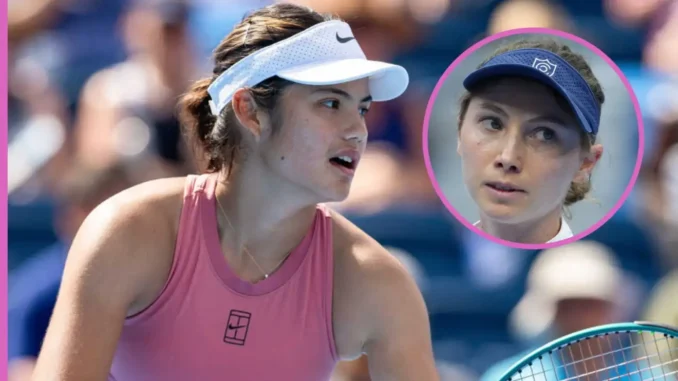
Under the shimmering lights of Beijing’s National Tennis Center, where the air hums with anticipation and the scent of autumn crispness mingles with the thrill of competition, Emma Raducanu steps onto the court for a pivotal moment in her 2025 resurgence. The 22-year-old British sensation, seeded 30th in the China Open, bypasses the first round to face a ghost from her recent past: Spain’s Cristina Bucsa, the qualifier who has clawed her way into the main draw with grit and guile. It’s a matchup laced with familiarity—two clashes this year alone, split down the middle at 1-1—yet brimming with fresh intrigue as Raducanu chases the points that could catapult her into the WTA’s top 20 before the year fades. In the sprawling 96-player field of this WTA 1000 spectacle, running from September 24 to October 5, victory here isn’t just about advancing; it’s about reclaiming momentum on the fast hard courts that have long suited her explosive game.
Raducanu’s path to this rematch has been a rollercoaster of resilience and near-misses, a narrative that echoes the fairy-tale grit of her 2021 US Open triumph. After a back injury sidelined her from the Auckland opener, she roared into the Australian Open’s third round, toppling 26th seed Ekaterina Alexandrova in a tiebreak thriller before falling to world No. 1 Iga Swiatek. The clay swing brought flashes of brilliance—a fourth-round duel with Coco Gauff in Rome that tested her tactical depth—while Wimbledon’s grass bowed to Aryna Sabalenka in the third round, a gritty two-setter that hinted at her growing mental steel. North America’s hard-court circuit amplified her surge: quarterfinals in Miami, where her baseline firepower overwhelmed early foes, and a semifinal run in Washington that reclaimed her British No. 1 status. Yet, heartbreak lingered in Montreal’s third-round exit to Amanda Anisimova and a US Open third-round rout by Elena Rybakina. Most poignantly, last week’s Korea Open saw her squander three match points against 2024 Wimbledon champion Barbora Krejcikova in a three-set epic, a defeat that stung but underscored her 27-19 record this season—her most consistent yet.
Bucsa, at 27, enters as the underdog but no stranger to upsets. Ranked around No. 67, the Spaniard has pieced together a 29-26 ledger in 2025, with 19-15 on hard courts, blending steady defense with opportunistic bursts. Her qualifying run in Beijing—edging past Maria Lourdes Carle 7-5, 6-4 in the final hurdle—mirrors the tenacity that snared her first win over Raducanu in January’s Singapore Open, a grueling 5-7, 7-5, 7-5 affair on indoor hard where Bucsa’s endurance edged out the Brit’s aggression. Raducanu flipped the script in June at Queen’s, storming to a 6-1, 6-2 demolition in the first round, her serve-and-volley precision leaving Bucsa scrambling. “It’s always tough facing someone you’ve played before,” Raducanu reflected after a recent practice, her voice carrying the quiet fire of someone who’s learned to channel setbacks into fuel. “Cristina’s got that fight—you have to respect it. But I’ve got to impose my game early, keep the points short, and not let her drag me into those long rallies.”
This third encounter, slated for Saturday at 7 p.m. local time on the Lotus Court, promises fireworks on the speedy Beijing surface. Raducanu’s clean ball-striking and return prowess—honed under new coach Francisco Roig, whom she prioritized over a Billie Jean King Cup commitment—give her the edge. Odds tilt heavily in her favor at 2/7, with Bucsa at 13/5, but the Spaniard will counter with placement and consistency, aiming to test Raducanu’s shot tolerance and exploit any lapses in focus. A win propels the victor into a blockbuster third-round clash against either world No. 7 Jessica Pegula or Ajla Tomljanovic, a rematch of Raducanu’s Billie Jean King Cup semifinal loss to the American. Beyond that? A potential last-16 date with four-time major winner Naomi Osaka, then Swiatek in the quarters—a gauntlet that could net 215 points for a quarterfinal run, inching Raducanu closer to her top-20 dream. “I’ve just got to do my best in the next few months until Australia,” she said post-Korea, eyes fixed on a seeded Melbourne slot. “Keep working to close the gap… I think I’m improving for sure in the last few months. I just need to stay consistent.”
The China Open’s allure extends far beyond this duel. With $1.124 million for the champion and 1,000 ranking points on offer, it’s a prize that could redefine trajectories. Defending titlist Coco Gauff headlines the bottom half, fresh off a US Open semifinal, while Swiatek lurks as the top seed, her Polish precision a looming threat. For the Brits, it’s a trio’s tale: unseeded Katie Boulter and Sonay Kartal open against qualifiers, their Billie Jean King Cup semis—losses to Pegula and Emma Navarro—fresh scars turned motivators. Raducanu, though, carries the weight of expectation, her 16-11 hard-court mark this year a canvas for bolder strokes. Whispers of physical niggles surfaced during Beijing practices—she touched her side and confided to fans she “wasn’t feeling well”—but her camp dismisses it as minor, a footnote in a season of rebuilt fortitude.
In the grand theater of tennis, where every forehand can rewrite history, Raducanu vs. Bucsa feels like destiny’s tease. It’s a test of who adapts faster: the qualifier’s hunger or the seed’s pedigree. For Raducanu, it’s personal—a chance to bury the ghosts of squandered match points and affirm her evolution from prodigy to contender. As the crowd swells and the baseline beckons, one thing’s clear: in Beijing’s cauldron, familiarity breeds not complacency, but combat. And if Raducanu channels that post-Korea resolve—”put this one behind”—the top 20 might just feel a little closer come Sunday dawn.
Leave a Reply